Germany Opportunity Card: The Complete Guide for Skilled Workers in 2025
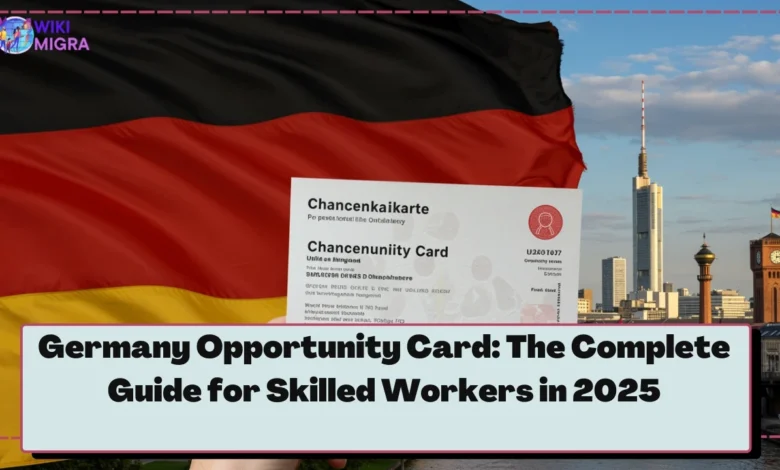
The Germany Opportunity Card (Chancenkarte Germany) is a new points-based immigration pathway that allows qualified non-EU professionals to move to Germany without a job offer. Introduced as part of Germany’s strategy to address skilled labor shortages, the Germany Opportunity Card offers a streamlined route for international talent to enter the German job market and potentially settle in the country. If you’re looking to apply for the Germany Opportunity Card, this comprehensive guide covers everything you need to know about the German job seeker visa points system.
Whether you’re a recent graduate, an experienced professional, or someone looking for new career horizons, the Germany Opportunity Card could be your ticket to working and living in one of Europe’s strongest economies. In this comprehensive guide, we’ll walk you through the Germany Opportunity Card requirements, eligibility criteria, and application process for this exciting new option to move to Germany without a job offer.
You may be interested in: In-Depth: Germany Opportunity Card Points System Calculator & Detailed Breakdown
What is the Germany Opportunity Card (Chancenkarte Germany)? A Deep Dive
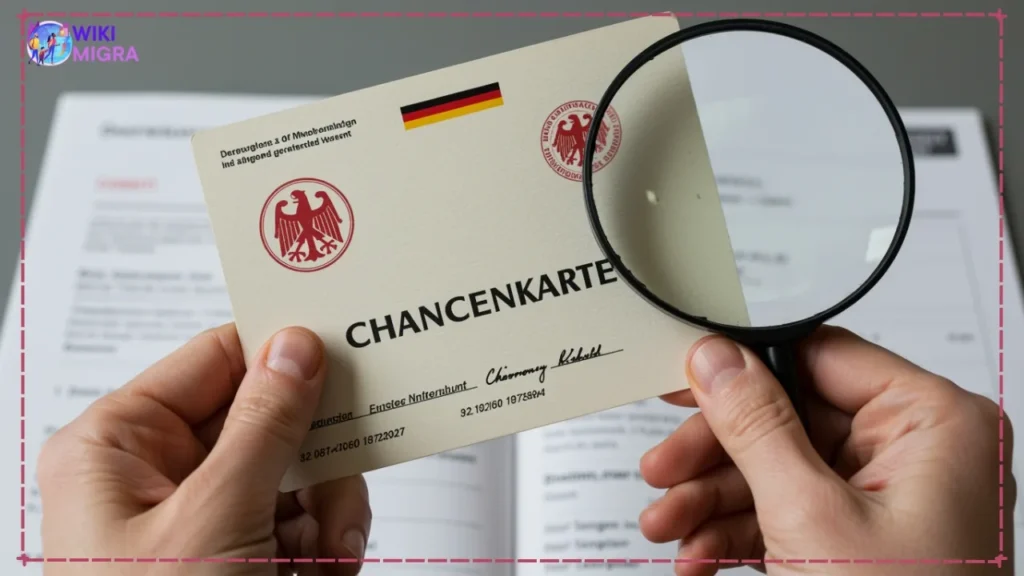
The Germany Opportunity Card, officially known as “Chancenkarte” in German, is a specialized residence permit that allows qualified foreign professionals to move to Germany without a job offer for up to one year to seek employment. Unlike traditional work visas, the Germany Opportunity Card lets you apply for Germany Opportunity Card without securing employment first, making it an attractive option for those wanting to explore the German job market firsthand.
Official Definition and Purpose
The Chancenkarte was introduced as part of Germany’s Skilled Immigration Act reforms to attract qualified workers from non-EU countries. Its primary purpose is to help address Germany’s growing skilled labor shortage by making it easier for international talent to enter the country and find suitable employment.
How Does It Compare to Other German Visas?
Understanding how the Opportunity Card differs from other German immigration pathways is crucial for determining which option is best for your situation.
| Feature | Opportunity Card | Job Seeker Visa | EU Blue Card |
|---|---|---|---|
| Purpose | Find skilled employment | Find skilled employment | Work in a specific job |
| Pre-requisite | No job offer needed | No job offer needed | Job offer required |
| Qualification | Vocational/university degree | University degree | University degree |
| Points System | Yes (minimum 6 points) | No | No |
| Duration | 1 year (non-extendable) | 6 months (non-extendable) | 4 years (extendable) |
| Work Permission | Limited (trial work up to 20hrs/week) | None | Full working rights |
| Path to Settlement | Convert to work permit after finding job | Convert to work permit after finding job | Direct path (after 21-33 months) |
| Family Reunification | After securing employment | After securing employment | Immediate |
Key Benefits of the Opportunity Card
- No Job Offer Required: Unlike most German work permits, you can enter Germany without having secured employment first.
- Longer Job Search Period: With up to 12 months (compared to 6 months on the Job Seeker Visa), you have more time to find the right position.
- Work Trial Opportunities: You can engage in trial work for up to 20 hours per week, helping you to get a foot in the door with German employers.
- Flexibility: The points-based system offers multiple ways to qualify, accommodating diverse professional backgrounds.
- Simplified Process: For those who meet the criteria, the application process is more streamlined than some other immigration pathways.
- Path to Settlement: Once you find qualified employment, you can transition to a long-term residence permit with a pathway to permanent residence.
You may be interested in: Proof of Financial Means Germany Visa: Complete Guide for Opportunity Card Applicants
Germany Opportunity Card Eligibility Criteria: Am I Qualified?
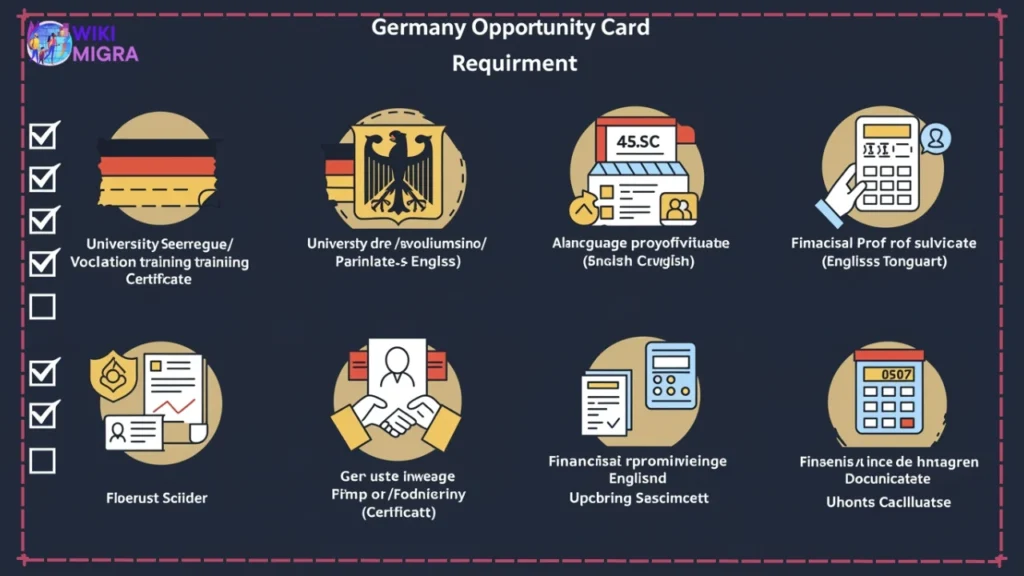
To qualify for the Germany Opportunity Card, you must meet certain mandatory Germany Opportunity Card requirements and score at least 6 points on the German job seeker visa points system. Let’s break down the Germany Opportunity Card eligibility criteria you need to meet to move to Germany without a job offer:
Basic Prerequisites (Mandatory)
1. Recognized Qualification
You must have a university degree or completed vocational training of at least two years that is recognized in Germany. This is a fundamental requirement that cannot be waived.
How to check qualification recognition:
- For university degrees: Use the Anabin database to check if your university and degree are recognized in Germany.
- For vocational qualifications: Apply for recognition through the Recognition in Germany portal.
- Get official assessment: For many qualifications, you’ll need an official Statement of Comparability from the Central Office for Foreign Education (ZAB).
Pro Tip: Start the recognition process early, as it can take 3-4 months to complete and is required before applying for the Opportunity Card.
2. Language Skills
You must demonstrate proficiency in either:
- German language at minimum A1 level, OR
- English language at minimum B2 level
These requirements ensure that you can effectively communicate during your job search in Germany.
Accepted language certificates:
For German:
- Goethe-Institut certificates
- TestDaF
- telc German certificates
- ÖSD certificates
For English:
- IELTS (minimum score 5.5-6.0)
- TOEFL iBT (minimum score 72-94)
- Cambridge English (minimum B2 First)
- PTE Academic (minimum score 59)
3. Sufficient Financial Resources
You must prove that you can support yourself during your stay in Germany without relying on public funds. This typically means showing:
- Proof of financial means: Approximately €1,027 per month (as of 2025) for the entire duration of your stay
- Common proof methods:
- Blocked bank account in Germany (e.g., with providers like Fintiba or Coracle)
- Bank statements showing sufficient savings
- Declaration of commitment (Verpflichtungserklärung) from a sponsor in Germany
The German Job Seeker Visa Points System Explained (Minimum 6 Points Required)
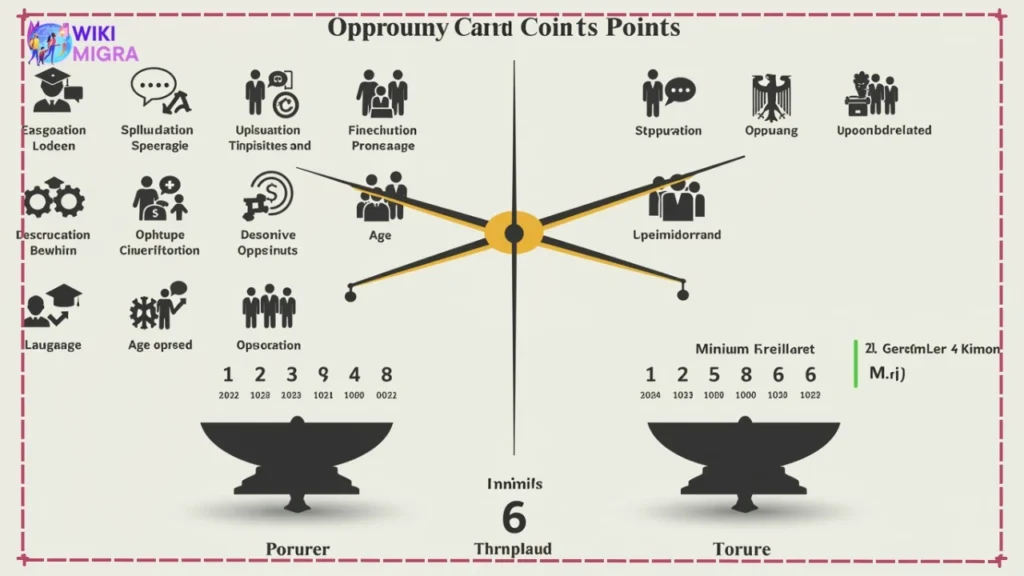
The Germany Opportunity Card (Chancenkarte Germany) uses a points-based system to evaluate your qualifications. You need to score at least 6 points across various categories to meet the Germany Opportunity Card eligibility requirements.
Points Calculator
Use this breakdown to calculate your potential points:
| Category | Criteria | Points |
|---|---|---|
| Qualification Recognition | Partial recognition of professional qualification | 2 points |
| German Language Skills | B1 level | 2 points |
| B2 level | 3 points | |
| C1 level or higher | 4 points | |
| English Language Skills | C1 level or higher | 2 points |
| Professional Experience | 3+ years related to qualification | 3 points |
| Age | Under 35 years | 2 points |
| 35-40 years | 1 point | |
| Previous Stays | Previous stays in Germany | 1 point |
| EU Connection | Spouse/partner meets requirements | 2 points |
Detailed Breakdown of Point Categories
Partial Professional Qualification Recognition
If your qualification is only partially recognized in Germany, you can still earn 2 points in this category. This applies when:
- Your degree is recognized but requires some additional courses or examinations
- Your vocational training is shorter than the German equivalent
- Only certain parts of your qualification are recognized
You’ll need official documentation from the recognition authority stating the partial recognition status.
Language Skills
German language proficiency:
- B1 level: Intermediate ability to communicate in everyday situations (2 points)
- B2 level: Upper intermediate, ability to discuss a wide range of topics (3 points)
- C1 or higher: Advanced, near-native proficiency (4 points)
English language proficiency:
- C1 or higher: Advanced proficiency (2 points)
Example: Maria has a B2 German certificate and C1 English certificate. She earns 3 points for German and 2 points for English, totaling 5 points from language skills alone.
Professional Experience
You can earn 3 points if you have at least three years of professional experience related to your qualification within the past seven years.
Example: Ahmed has a mechanical engineering degree and has worked as an engineer for five years in the past seven years. He earns 3 points for professional experience.
Age Factor
- Under 35 years: 2 points
- Between 35-40 years: 1 point
- Over 40 years: 0 points
Example: Sophia is 33 years old, earning her 2 points in this category.
Previous Stays in Germany
If you’ve previously lived in Germany (e.g., for study, work, or research), you earn 1 point. You’ll need to provide documentation such as previous residence permits, registration certificates, or work/study contracts.
Spouse/Partner Potential
If your spouse or registered life partner also meets the requirements for the Opportunity Card, you can earn an additional 2 points. Both of you would need to apply separately.
Point Calculation Examples
Example 1: Meeting the minimum requirement
- University degree (recognized in Germany): Mandatory requirement
- German A1 level: Mandatory requirement
- Age 34: 2 points
- Professional experience (4 years): 3 points
- English C1 level: 2 points Total: 7 points ✓
Example 2: High points score
- Vocational training (2 years, recognized): Mandatory requirement
- German B2 level: 3 points
- English C1 level: 2 points
- Age 32: 2 points
- Professional experience (3+ years): 3 points
- Previous stay in Germany: 1 point Total: 11 points ✓
Example 3: Not enough points
- University degree (recognized): Mandatory requirement
- English B2 level: Mandatory requirement
- Age 42: 0 points
- Professional experience (2 years): 0 points
- No previous stay in Germany: 0 points Total: 0 points ✗
How to Apply for Germany Opportunity Card: Step-by-Step Guide
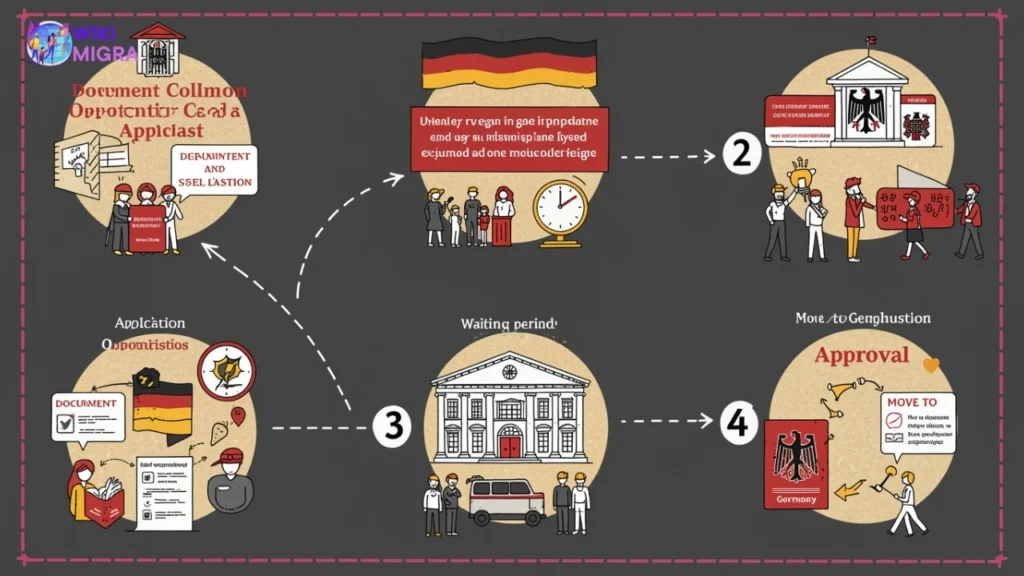
Applying for the Germany Opportunity Card involves several steps and careful preparation of documentation. Here’s a comprehensive guide to help you navigate the process to apply for Germany Opportunity Card and move to Germany without a job offer:
Where to Apply
- From abroad: Apply at the German embassy or consulate in your country of residence
- If already in Germany: Apply at the local immigration office (Ausländerbehörde) if you have legal residence status
Document Checklist
Here’s everything you’ll need to prepare for your application:
Essential Documents
- Valid passport (valid for at least 6 months beyond your intended stay)
- Completed application form (available from the German mission or Ausländerbehörde)
- Biometric photos (meeting requirements for German official documents)
- Proof of qualification and recognition:
- Original degree/training certificate with translation
- Recognition certificate from German authorities
- ZAB Statement of Comparability (if applicable)
- Proof of language skills:
- German language certificate (minimum A1)
- English language certificate (minimum B2)
- Evidence for points claimed:
- Professional experience certificates
- Previous German residence permits
- Spouse’s qualifications (if claiming points)
- Proof of financial means:
- Blocked account statement
- Bank statements
- Declaration of commitment (Verpflichtungserklärung)
- CV/Resume (in German or English)
- Motivation letter explaining your interest in working in Germany
- Proof of health insurance (valid for Germany)
Pro Tip: Create a document folder with originals and copies of all documents. Organize them according to the checklist provided by your local German mission.
Application Tips
- Prepare early: Start collecting documents at least 3-6 months before you plan to apply
- Quality translations: Ensure all non-German/English documents are professionally translated
- Verification: Some documents may need apostille or authentication
- Digital copies: Scan all documents and keep digital copies for your records
- Follow local requirements: Different German missions may have slightly different requirements
Application Fees
- Application fee: Approximately €75-100 (varies slightly by location)
- Additional fees may apply for document verification, translations, and recognition processes
Processing Times
- Average processing time: 4-12 weeks
- Factors affecting processing:
- Completeness of application
- Verification needs
- Workload at the specific mission
- Seasonal factors (holiday periods often cause delays)
Note: Processing times are estimates and can vary significantly. Plan accordingly and avoid making irreversible arrangements until your Opportunity Card is approved.
Life in Germany with the Germany Opportunity Card
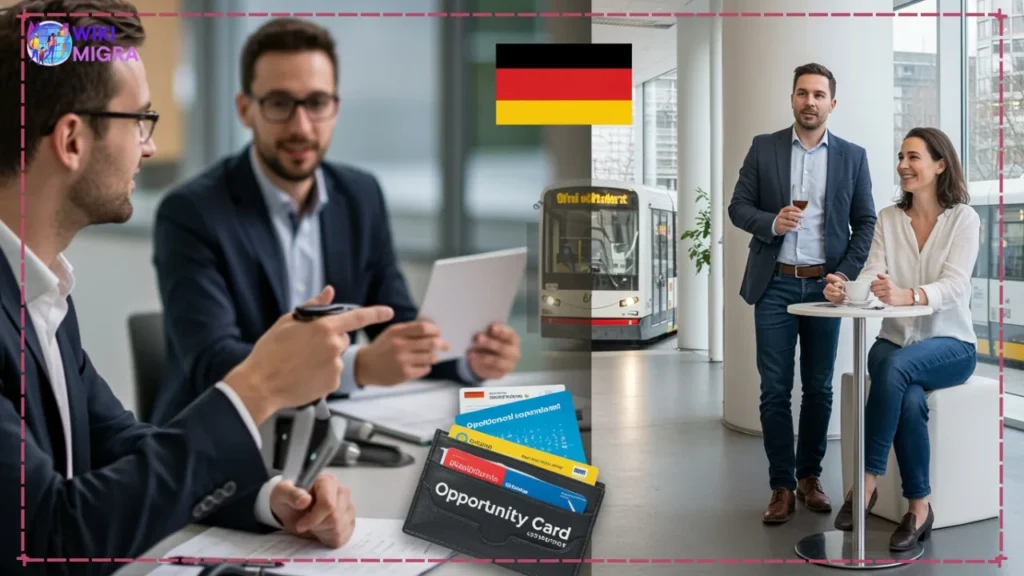
Once you’ve obtained your Germany Opportunity Card and successfully used the Chancenkarte Germany to move to Germany without a job offer, you’ll need to navigate life in Germany while searching for employment. Here’s what you need to know:
Rights and Limitations
With the Opportunity Card, you can:
- Stay in Germany for up to one year
- Search for qualified employment matching your qualifications
- Engage in trial work for up to 20 hours per week
- Participate in job interviews and assessments
- Attend job fairs and networking events
Limitations to be aware of:
- You cannot work full-time until you find qualified employment and convert your status
- The card is generally non-extendable beyond one year
- You cannot claim unemployment benefits or most social benefits
- Family members typically cannot join you during the job search phase
Finding Accommodation
Securing housing in Germany can be challenging, especially in major cities. Consider these options:
- Temporary accommodations:
- Short-term furnished apartments (möblierte Wohnung)
- Serviced apartments
- Extended-stay hotels
- Shared accommodations (Wohngemeinschaft or WG)
- Long-term housing:
- Start looking once you have employment secured
- Typical requirements include proof of income, SCHUFA credit check, and security deposit
Pro Tip: Consider starting in a short-term accommodation and transitioning to a longer-term solution once you’ve found employment.
Job Search Strategies
The German job market has its unique characteristics. Here are some effective strategies:
- Online job portals:
- StepStone
- Indeed Germany
- Make it in Germany job board
- Networking:
- Professional meetups and events
- Industry conferences
- Expat communities
- Alumni associations
- Direct applications:
- Research companies in your field
- Send unsolicited applications even if no positions are advertised
- Follow up with phone calls
- Recruitment agencies:
- Specialized agencies for your industry
- International recruitment firms with German presence
- Job fairs:
- Industry-specific events
- International talent fairs
- University career events (even for non-students)
Cultural Tips for Job Hunting in Germany
- Application style: German applications typically include a CV, cover letter, all certificates, and reference letters in a single PDF
- CV format: Include a professional photo and personal details (standard in Germany)
- Interview culture: Be punctual, formal, and prepared with specific examples of your skills
- Follow-up: Send a thank-you email after interviews, but don’t be overly persistent
Cost of Living Overview
Living expenses vary significantly across Germany. Here’s a rough monthly budget for a single person:
| Expense Category | Major City (e.g., Munich) | Mid-sized City (e.g., Leipzig) |
|---|---|---|
| Rent (1-bedroom) | €800-1,400 | €400-800 |
| Utilities | €150-250 | €100-200 |
| Food | €250-350 | €200-300 |
| Public Transport | €70-90 | €50-70 |
| Health Insurance | €110-180 | €110-180 |
| Internet/Mobile | €40-60 | €40-60 |
| Leisure | €150-300 | €100-200 |
| Total (approx.) | €1,570-2,630 | €1,000-1,810 |
Once You Have the Germany Opportunity Card: Next Steps
The Germany Opportunity Card is your entry point into the German job market after you move to Germany without a job offer, but what happens after you find employment using your Chancenkarte Germany?
Finding Qualified Employment
To transition from the Opportunity Card to a work residence permit, you need to find employment that:
- Is relevant to your qualifications
- Meets minimum salary requirements (varies by profession)
- Has a contract of at least 12 months
Converting to a Work Residence Permit
Once you’ve secured appropriate employment, you can apply to convert your Opportunity Card to one of these residence permits:
- EU Blue Card:
- For university graduates
- Minimum salary requirement (€52,000 in 2025, or €40,560 for shortage occupations)
- Fast track to permanent residence (21-33 months)
- Residence Permit for Qualified Professionals:
- For university graduates or vocational qualification holders
- Position must match your qualification
- No minimum salary requirement, but must be sufficient for self-support
- Path to permanent residence after 4 years
- IT Specialist Permit:
- For IT professionals with significant practical experience
- Can substitute formal qualifications in some cases
- Minimum salary requirements apply
Family Reunification
While family members generally cannot join you during the Opportunity Card phase, they can join once you’ve secured qualified employment and converted to a work residence permit:
- Spouse/registered partner
- Unmarried children under 18
Requirements for family reunification typically include:
- Adequate living space
- Sufficient financial means
- Basic German language skills (A1) for spouses
- Health insurance for all family members
How can I get an opportunity card in Germany?
To obtain an Opportunity Card in Germany, you must meet the following requirements:
- Basic Eligibility Criteria:
- Have at least two years of vocational training or a university degree recognized in your country of origin.
- Demonstrate basic German (A1 level) or English (B2 level) language proficiency.
- Prove financial means to support yourself during your stay in Germany.
- Application Process:
- Apply at the competent German mission abroad (e.g., German Embassy or Consulate) or, if already in Germany, at the local Foreigners’ Registration Office.
- Submit required documents such as proof of qualifications, language skills, financial means, and a valid passport.
- If applying through the points system, achieve a minimum of 6 points based on criteria like work experience, age, and connection to Germany.
- Duration and Conditions:
- The Opportunity Card allows a 12-month residence permit for job searching or qualification recognition.
- During this period, you can work part-time (up to 20 hours per week) or take trial jobs.
- Documents Needed:
- Completed application form.
- Valid passport with at least six months remaining validity.
- Proof of qualifications and language skills.
- Evidence of financial means (e.g., blocked account or formal declaration of commitment).
- Private health insurance covering up to €30,000.
- Points System (if applicable):
- Points are awarded for factors like qualifications recognition in Germany, language skills, work experience, age under 35 years, and connections to Germany.
For more details and self-check tools for eligibility, visit Make it in Germany or Chancenkarte.com.
How much bank balance is required for an opportunity card in Germany?
You must demonstrate sufficient financial means to support yourself during your stay in Germany for the Opportunity Card. This can be proven through a part-time job (up to 20 hours per week) or by showing a bank balance that covers your living expenses. The exact amount is not explicitly stated but should align with the minimum subsistence level in Germany, which is approximately €934 per month as of 2025, totaling around €11,208 for one year.
How can I get an opportunity in Germany?
To get an opportunity in Germany, follow these steps:
- Check Your Eligibility: Use the “Quick Check” tool on the Make it in Germany website to determine your chances of working in Germany. Certain professions like healthcare, IT, engineering, and teaching are in high demand.
- Recognize Your Qualifications: Ensure your professional or educational qualifications are recognized in Germany by visiting the Recognition in Germany portal.
- Search for Jobs: Explore job portals such as:
- Make it in Germany Job Listings
- Federal Employment Agency (BA)
- International job boards like LinkedIn or EnglishJobs.de.
- Prepare Your Application: Create a German-style application including a cover letter, CV with a photo, and relevant certificates or testimonials.
- Apply for a Visa (if required): Depending on your nationality, you may need a visa to work in Germany. Non-EU citizens can apply for visas such as:
- EU Blue Card
- Job Seeker Visa
- Skilled Worker Visa
- Obtain Health Insurance: Health insurance is mandatory from the first day of your stay in Germany.
- Attend Job Fairs and Network: Participate in job fairs or connect with recruiters via platforms like EURES or LinkedIn to increase opportunities.
- Consider Recruitment Agencies: Private recruitment agencies can assist but verify potential fees beforehand.
Is the Germany Opportunity Card worth it?
Yes, the Germany Opportunity Card is worth it for skilled non-EU workers seeking employment in Germany, as it provides a streamlined pathway to job opportunities, allows part-time work during the job search period, and offers potential pathways to permanent residency.
You may be interested in: German Language Levels for Visas: A1 vs. B2 for the Opportunity Card Explained
Frequently Asked Questions about the Germany Opportunity Card
Germany Opportunity Card Eligibility Questions
Can I apply for the Germany Opportunity Card if I am over 40?
Yes, you can still apply for the Germany Opportunity Card if you’re over 40, but you won’t receive age-related points in the German job seeker visa points system. You’ll need to compensate by earning more points in other categories to reach the minimum 6 points required to meet the Germany Opportunity Card requirements.
Is a university degree mandatory, or can I apply with vocational training?
Both university degrees and vocational training qualifications (minimum 2 years) are acceptable, provided they are recognized in Germany.
Can I apply with a qualification that’s only partially recognized?
Yes, and you can even earn 2 points for a partially recognized qualification. However, you must still meet the basic requirement of having a formal qualification that’s at least partially recognized.
What if my university isn’t listed in the Anabin database?
You’ll need to apply for individual recognition through ZAB. This process takes additional time, so start early.
Application Process
Is a blocked account mandatory for the Opportunity Card?
No, a blocked account is just one option to prove financial resources. Bank statements or a formal declaration of commitment from a sponsor in Germany are also acceptable.
Can I apply for the Opportunity Card while in Germany on a tourist visa?
Generally no. In most cases, you need to apply from your home country or a country where you have legal residence status.
How long does the application process take?
Processing times typically range from 4-12 weeks, but can vary significantly depending on the workload at your local German mission and the completeness of your application.
Can I expedite my application?
There’s no formal expedited process, but ensuring your application is complete and well-organized can help speed up processing.
During Your Stay
What happens if I don’t find a job within one year?
The Opportunity Card is valid for one year and is not extendable. If you don’t find qualified employment within this period, you’ll need to leave Germany or apply for a different type of residence permit if you qualify.
Can I do an internship on the Opportunity Card?
Yes, as long as it’s limited to 20 hours per week. Full-time internships would require converting to an appropriate work permit.
Is the Opportunity Card extendable?
No, the Opportunity Card is generally not extendable beyond the initial one-year period.
Can I travel outside Germany with the Opportunity Card?
Yes, the Opportunity Card allows you to travel within the Schengen Area for up to 90 days within any 180-day period. However, remember that your primary purpose should be job searching in Germany.
Can I start my own business with the Opportunity Card?
No, the Opportunity Card does not permit self-employment or freelance work. You would need to apply for a different type of residence permit for these activities.
Post-Opportunity Card
Can I switch to a student visa if I decide to study in Germany?
Potentially yes, but you would need to apply for a student residence permit and meet all relevant requirements, including university admission and proof of financial resources.
What happens if I find a job outside my field of qualification?
To convert to a work residence permit, the job should generally match your qualifications. Jobs in unrelated fields might not qualify for a skilled worker residence permit.
How soon can I apply for permanent residence?
The timeline varies based on which work permit you transition to:
- EU Blue Card holders: 21 months (with B1 German) or 33 months (with A1 German)
- Skilled worker permit holders: 4 years (with B1 German and other requirements)
Latest News & Updates on the Chancenkarte Germany
This section will be updated regularly with the latest information about the Germany Opportunity Card program and changes to the Germany Opportunity Card requirements and eligibility criteria.
May 2025 Updates:
- The points calculation system remains unchanged for 2025
- Application fees have been adjusted slightly (reflected in the application section above)
- Online applications are now accepted at select German missions
Recent Policy Clarifications:
- Trial work periods can include remote work for German employers
- Language certificates are now valid for 2 years from the date of issuance
- Digital copies of certain documents are now accepted at most German missions
Note: Always check the official Make it in Germany website for the most current information and requirements.
Resources & Official Links
Official Government Resources
- Make it in Germany – Official portal for qualified professionals
- Federal Employment Agency – Information on the German job market
- Federal Office for Migration and Refugees (BAMF) – Immigration information
- Recognition in Germany – Qualification recognition portal
- Anabin Database – Database of recognized foreign educational qualifications
German Embassies and Consulates
- Find a German Mission Abroad – Official directory
Language Certification
- Goethe-Institut – German language tests
- IELTS – English language tests
- TestDaF – German language tests for academic purposes
Job Search Platforms
Accommodation Resources
- WG-Gesucht – Shared accommodations
- ImmobilienScout24 – Apartment listings
- Wunderflats – Furnished temporary apartments
Practical Information
- Expatica Germany – Expat guides and resources
- How to Germany – Information for foreigners in Germany
- Settle in Berlin – City-specific guides
Conclusion
The Germany Opportunity Card represents an exciting pathway for qualified professionals looking to move to Germany without a job offer and establish themselves in the German job market. With its German job seeker visa points system and flexible approach, the Chancenkarte Germany removes many of the traditional barriers to immigration, making Germany more accessible than ever for international talent.
Whether you’re a recent graduate, a mid-career professional, or simply looking for new horizons, the Germany Opportunity Card could be your gateway to living and working in one of Europe’s most stable and prosperous economies.
Ready to take the next step? Review the Germany Opportunity Card eligibility criteria, calculate your points based on the Germany Opportunity Card requirements, and start preparing your application to apply for Germany Opportunity Card. Your German career journey awaits!
This article was last updated on May 6, 2025. Information may change, so always verify details with official sources before making any decisions.





